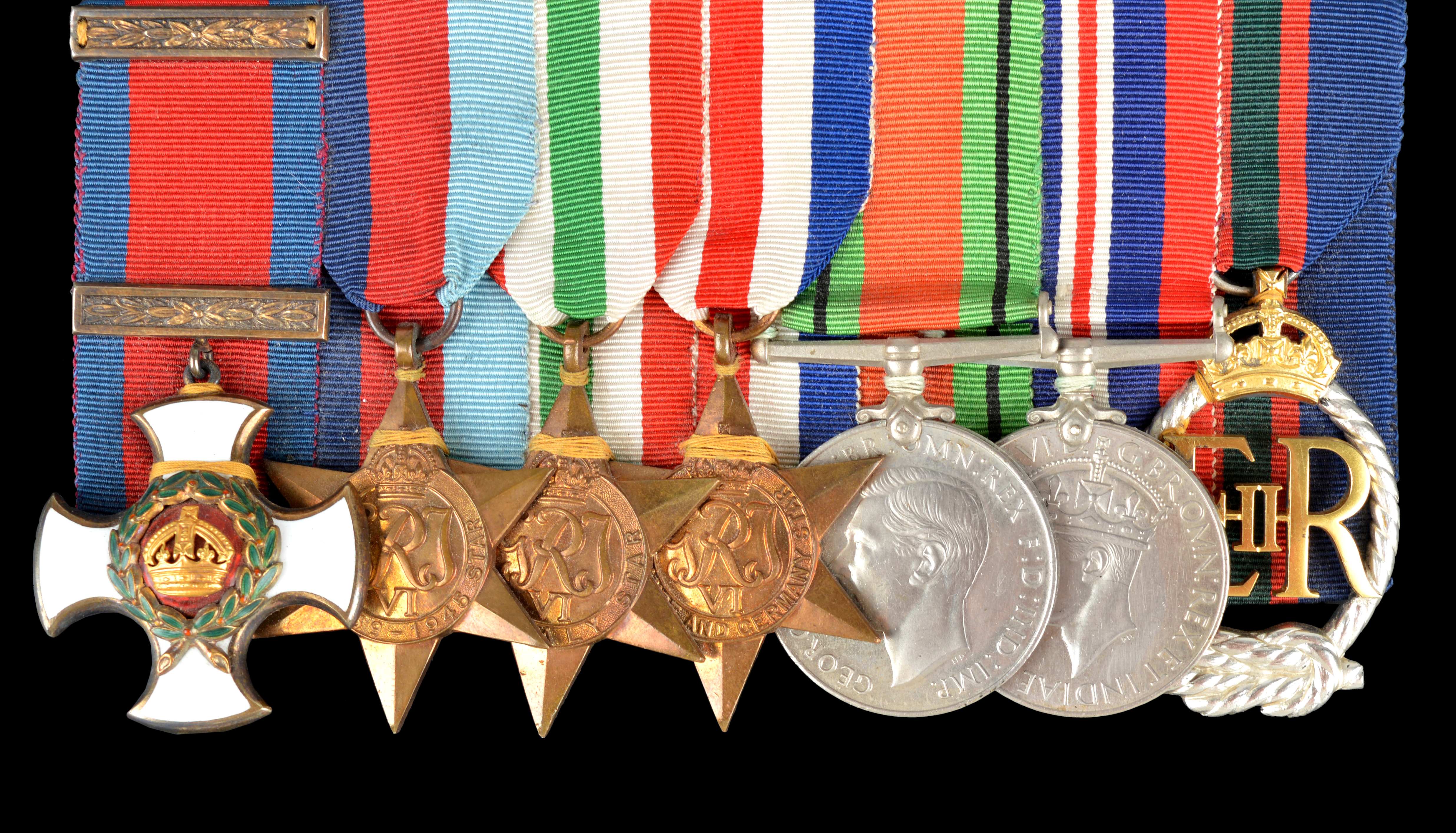Medals & Coins, Arms & Armour - 20th November 2019
Lot 1
The Operation Husky Immediate Distinguished Service Order group to Temporary Acting Captain...
Estimate £3,000 - £5,000 | Hammer £3500
+ Buyers Premium
Description

The Operation Husky Immediate Distinguished Service Order group to Temporary Acting Captain (later Lieutenant Colonel) William Cunningham, Royal Marines: D.S.O.. George VI; 1939-45 Star; Italy Star; France and Germany Star; Defence Medal; British War Medal 1939-45; Royal Naval Volunteer Reserve Decoration, Elizabeth II, reverse dated 1956; mounted for wearing, nearly extremely fine; together with a mounted group of corresponding dress miniatures; the recipient's King's Badge with letter of issue; and accompanied by a large quantity of associated documents and ephemera, including: the recipient's commission, a portrait photograph of him in uniform beside his older brother, John 'Cat's Eyes' Cunningham, R.A.F., official correspondence, a reconnaissance photographs dated for June 1943 and apparently showing one of the Husky landing beaches, and much other material.
D.S.O. London Gazette 29/10/1943
William Cunningham enlisted as a Marine on the 14th May 1940. He was commissioned as a Temporary Lieutenant in August of that year, and in October he was appointed to 103 Brigade for the 8th Battalion R.M.. He spent some of this time as an instructor at the R.M. Cadet Training Unit at Thurlestone.
In November 1942 he transferred to the newly formed 41 (Royal Marine) Commando, with the rank of Acting Temporary Captain.
A period of intensive training followed - the unit diary for 21 June 1943 records, for example: "…40 and 41 Commandos and Bde H.Q. landed at Brodick (Arran) for cliff climbing exercises". Two days later, the senior officers travelled by air to London to "collect latest oblique photographs of "HUSKY""
The planning for Husky involved the convergence on Sicily of three naval task forces. The Special Service Brigade comprised of 40 and 41 Commandos and commanded by Brigadier Robert Laycock was attached to the 1st Canadian Division, which set out from the UK as part of Task Force V under Admiral Philip Vian, on the 28th June.
The Special Service Brigade was assigned to the extreme western end of the British landing beaches, on the Pachino peninsula, to protect the Canadian landing by capturing coastal gun emplacements and then providing flank protection until the rest of the force was established ashore. The neutralisation of one such strong point was the particular responsibility of Cunningham and his troop, but their landing was hampered by heavy seas and logistical problems, and he found himself ashore in the wrong place, with a drastically understrength unit.
He led his men swiftly to their objective, where another problem awaited them. The enemy position, which Cunningham had approached from the rear, was protected by barbed wire entanglements, and the Bangalore torpedoes that he needed to clear it had been lost in the landing. He was obliged to use wire cutters instead - a far more hazardous method.
Next, Cunningham dashed round to the front of the emplacement, exposing himself to direct enemy fire, and personally silenced the position by putting a grenade through a loophole. The price of this success was a severe wound to his left arm caused by machinegun fire. In spite of this he refused to leave the field until the action had concluded, and according to the recommendation he accounted for a significant number of the enemy - either dead or taken prisoner.
The significance of his deed is summarized in the recommendation thus: "His leadership especially after a painful wound was an inspiration to all. I consider that less resolute action by this Officer would have resulted in considerably heavier casualties to our Troops"
It is noteworthy that for the Second World War the Royal Marines were awarded a mere 38 D.S.O.s (including second and third awards) - a tiny proportion of the overall total of 5,444. This group is thus very rare. Also of great interest is the fact that William Cunningham was the younger brother of the highly decorated pilot John 'Cat's Eyes' Cunningham.
Following a period of recuperation, Cunningham